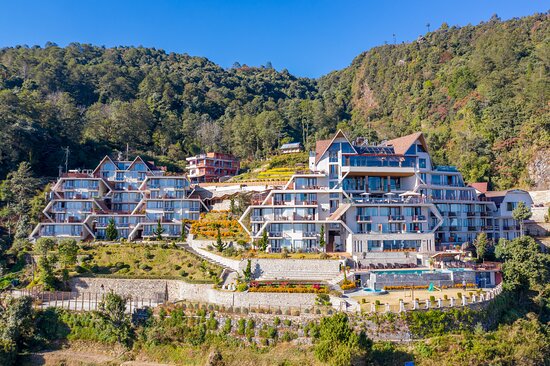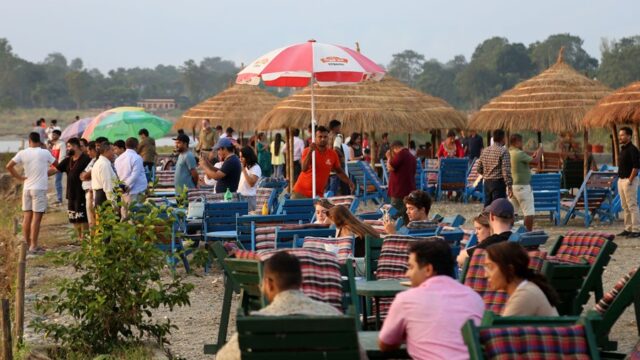Nepal, known for its breathtaking landscapes and rich cultural heritage, is also becoming a leading destination for eco-conscious travelers seeking sustainable accommodations. As global awareness about environmental conservation grows, Nepal’s hospitality industry is responding with a range of eco-friendly accommodations that offer both comfort and a minimal environmental footprint. From luxury lodges nestled in pristine wilderness to quaint eco-lodges promoting sustainable living, Nepal’s eco-friendly options are diverse and cater to various preferences.
Tiger Tops Tharu Lodge
Located in the heart of Chitwan National Park, Tiger Tops Tharu Lodge is a pioneer in eco-tourism in Nepal. This lodge blends luxury with environmental responsibility, emphasizing conservation and community engagement. The lodge operates with minimal environmental impact by using solar energy for power and maintaining a waste management system that reduces its carbon footprint. The design incorporates traditional Tharu architecture and materials, enhancing the cultural experience while supporting local craftsmanship. Guests can enjoy guided jungle safaris and wildlife observation while contributing to conservation efforts that protect endangered species in the park.
Dwarika’s Resort
Situated in Dhulikhel, Dwarika’s Resort offers an exceptional eco-friendly experience with a focus on sustainability and cultural preservation. The resort’s design reflects traditional Newari architecture, utilizing locally sourced materials and employing sustainable construction practices. The property features an organic farm that supplies fresh produce for its restaurants, reducing the need for imported goods and promoting local agriculture. Dwarika’s Resort is committed to environmental stewardship, incorporating water-saving technologies and waste recycling systems. Guests can enjoy serene surroundings, luxurious accommodations, and holistic wellness experiences while knowing their stay supports sustainable tourism.
The Last Resort
Perched on the edge of the Bhote Koshi River, The Last Resort is a premier eco-lodge renowned for its commitment to sustainability and adventure. The lodge has implemented a range of eco-friendly practices, including the use of renewable energy sources and waste management systems. It also emphasizes conservation through various community projects and environmental initiatives. The Last Resort offers unique experiences such as bungee jumping and canyon swinging, all while maintaining a strong focus on minimizing environmental impact. Its remote location provides guests with an immersive natural experience, complemented by sustainable practices that protect the surrounding landscape.
Gosaikunda Hotel
Located near the sacred Gosaikunda Lake, the Gosaikunda Hotel is a model of eco-tourism in the high Himalayas. The hotel focuses on preserving the fragile alpine environment while providing comfortable accommodations for trekkers and nature enthusiasts. Solar panels and energy-efficient lighting are used to reduce the hotel’s carbon footprint. Additionally, the hotel supports local communities by sourcing food and supplies from nearby villages, which helps to promote sustainable livelihoods. The pristine setting of Gosaikunda, coupled with the hotel’s eco-friendly practices, offers visitors a unique opportunity to experience Nepal’s natural beauty while contributing to its conservation.
Everest Summit Lodge
For those seeking eco-friendly accommodation in the Everest region, Everest Summit Lodge provides a sustainable option amidst the world’s most iconic landscapes. The lodge emphasizes environmental responsibility through the use of renewable energy sources and waste reduction practices. Its design incorporates local materials and traditional architecture, aligning with the cultural heritage of the region. Everest Summit Lodge is committed to supporting the local Sherpa community and promoting responsible tourism. Guests can enjoy panoramic views of the Himalayas while knowing that their stay contributes to preserving the region’s natural and cultural heritage.
Shree Ganesh Eco Resort
Situated in the lush forests of the Kathmandu Valley, Shree Ganesh Eco Resort combines comfort with eco-consciousness. The resort’s commitment to sustainability is evident in its use of eco-friendly materials, energy-efficient systems, and water conservation measures. The resort also actively engages in local conservation projects and supports community development initiatives. Its serene location offers guests a tranquil retreat while promoting environmental stewardship. Shree Ganesh Eco Resort provides an excellent example of how luxury and sustainability can coexist harmoniously.
Sukhdham Eco Village
Sukhdham Eco Village, located on the outskirts of Pokhara, offers a unique eco-tourism experience with a focus on sustainable living and community involvement. The eco-village features traditional mud huts and solar-powered facilities, emphasizing minimal environmental impact. Sukhdham is dedicated to preserving local traditions and promoting sustainable agriculture through organic farming practices. Visitors can immerse themselves in the village’s eco-friendly lifestyle, participate in community activities, and enjoy locally sourced, organic meals. This eco-village represents a holistic approach to sustainable tourism, where guests contribute to environmental conservation and community well-being.
Mountain Lodges of Nepal
Mountain Lodges of Nepal, which operates several eco-friendly lodges along popular trekking routes, provides a model of sustainable tourism in remote areas. These lodges are designed to minimize environmental impact while offering comfortable accommodations to trekkers. They use solar energy for heating and lighting, implement waste management systems, and support local communities by sourcing food and supplies locally. The lodges are strategically located to provide breathtaking views of the Himalayas while promoting responsible tourism practices. Mountain Lodges of Nepal exemplifies how eco-friendly accommodations can enhance the trekking experience while contributing to conservation efforts.
Eco Hotel Kathmandu
Located in the bustling capital city, Eco Hotel Kathmandu offers a green retreat amidst the urban environment. The hotel integrates sustainable practices such as energy-efficient lighting, water-saving technologies, and waste-reduction initiatives. It also supports local artisans by featuring traditional Nepali crafts and products. Eco Hotel Kathmandu provides a comfortable and environmentally conscious option for travelers exploring the city. Its commitment to sustainability and support for local communities make it a standout choice for eco-minded visitors.
Tato Pani Resort
Tato Pani Resort, located in the scenic Tato Pani area, combines eco-friendly practices with a focus on guest comfort. The resort uses renewable energy sources and promotes water conservation through various measures. Its design incorporates local materials and traditional architecture, reflecting the region’s cultural heritage. Tato Pani Resort also engages in local conservation efforts and supports community development initiatives. Guests can enjoy the natural beauty of the area while contributing to environmental sustainability and community well-being.
Nepal offers a wide range of eco-friendly accommodations that cater to various preferences and budgets. From luxurious lodges in national parks to remote eco-villages and city-based green hotels, these options reflect a growing commitment to sustainable tourism. By choosing eco-friendly accommodations, travelers can enjoy Nepal’s stunning landscapes and rich cultural heritage while contributing to the preservation of its natural environment and supporting local communities.






